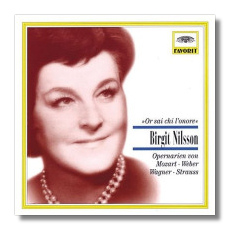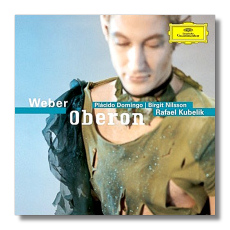
The Internet's Premier Classical Music Source
Related Links
- Latest Reviews
- More Reviews
-
By Composer
-
Collections
DVD & Blu-ray
Books
Concert Reviews
Articles/Interviews
Software
Audio
Search Amazon
Recommended Links
Site News
 CD Review
CD Review
Operas & Arias

Birgit Nilsson Singt Opernarien
Or sai chi l'onore
- Wolfgang Mozart: Don Giovanni, K 527 – Or sai chi l'onore & Crudele?… Non mi dir, bell' idol mio
- Carl Maria von Weber: Oberon, J 306 – Ozean! du Ungeheuer & Trauere, mein Herz
- Ludwig van Beethoven: Ah, Perfido!, Op. 65
- Richard Wagner:
- Tannhäuser – Dich, teure Hallé & Allmächt'ge Jungfrau "Elisabeth's Prayer"
- Tristan und Isolde – Mild und leise "Liebestod"
- Richard Strauss: Salome, Op. 54 – Final Scene
Birgit Nilsson, soprano
Prague National Theatre Orchestra/Karl Böhm
Bavarian Radio Symphony Orchestra/Rafael Kubelík
Vienna Symphony Orchestra/Ferdinand Leitner
Berlin Deutsche Oper Orchestra/Otto Gerdes
Bayreuth Festival Orchestra/Karl Böhm
Metropolitan Opera Orchestra/Karl Böhm
Deutsche Grammophon 431107-2 ADD 67:28


Carl Maria von Weber: Oberon
- Birgit Nilsson (Rezia)
- Plácido Domingo (Huon)
- Donald Grobe (Oberon)
- Julia Hamari (Fatime)
- Marga Schiml (Puck)
- Arleen Auger (First and Second Mermaids)
- Hermann Prey (Scherasmin)
Bavarian Radio Symphony & Chorus/Rafael Kubelík
Deutsche Grammophon 477564-4 ADD 2CDs: 64:58, 74:05
Swedish soprano Birgit Nilsson died on Christmas Day in 2005, leaving behind many wonderful memories of a great singer, particularly in the Wagnerian repertoire, and of a classy (but not stuck-up) lady. This CD contains some amazing singing. (It also includes selections that present her at less than her sterling best.) Unfortunately, it feels like an opportunistic rush job, starting with the weird bilingual title. (Why "Or sai chi l'onore," the first aria on the CD? Was Donna Anna really Nilsson's signature role? Even "Mild und leise" would have been a better title.) There is no booklet, just a title card with a sepia-toned, soft-focus photo of the singer on the front, and a track listing on the back. Even the selections – mostly taken from complete sets – are oddly edited. Elisabeth's "Dich teure Halle" is allowed to continue past its end so as to include a brief and uncredited contribution from Dietrich Fischer-Dieskau! If this release looks and feels like a budget-priced CD, it's because it is a budget-priced CD! Doesn't Birgit deserve better, though?
The CD begins weakly with Anna's two arias from Don Giovanni, taken from the complete set conducted by Karl Böhm. "Or sai chi l'onore" is not bad, although Nilsson's voice just sounds wrong here, but "Non mi dir" is really problematic; Nilsson simply could not negotiate Mozart's more florid writing convincingly. The result is sour and hardly stylish. Then we are given two of Rezia's arias from Weber's Oberon. (The complete recording is reviewed below.) This finds Nilsson closer to home. Next we have Beethoven's Ah! Perfido – not an "Opernarie" at all, but a free-standing concert aria. Nilsson sounds too strong and confident to convince anyone that she is a jilted lover, but the singing is healthy and easy to enjoy. The two arias from Tannhäuser (the Gerdes recording) find her on home territory, and she lands solidly on two feet with the Tristan und Isolde "Liebestod," taken from the Bayreuth Festival recording from 1966. Salome was one of Nilsson's most famous roles. DG couldn't (or wouldn't) get access to Nilsson's famous studio recording conducted by Solti (on Decca), so they did the next best thing and took Nilsson's live performance of the final scene, as given during Sir Rudolph Bing's farewell concert, live from the stage of the Metropolitan Opera in 1972. This is a glorious bit of singing, and if Nilsson is not as fresh here as she was on the Solti recording, she's even more demented. At the end, the audience goes crazy. I don't blame them.
In 1970, Rafael Kubelík made what was the first complete (more or less) recording of Oberon, which always has been a distant second to Der Freischütz in popularity. No doubt the presence of Birgit Nilsson lent attraction to a project that must have been a hard sell outside of German-speaking countries. Once you're past the magical Overture and Rezia's "Ozean, du Ungeheuer," Oberon is not at all familiar. The Overture is a potpourri of the score's best tunes, however, so if you enjoy it, you'll find much to enjoy in the opera proper. Not based on Shakespeare's A Midsummer Night's Dream, it is chiefly concerned with two lovers – the knight Huon, and Rezia (or Reiza), the daughter of a caliph. The English libretto is by James Robertson Planché, and it was translated into German by Christoph Martin Wieland. Both the English and German versions have their adherents. Because it was recorded in Munich with an international cast (including a young Plácido Domingo), Kubelík's version is sung in German.
There is much spoken material between the musical numbers. Here, it has been trimmed, and a speaking character named Droll has been introduced to facilitate continuity. Not being fluent in German, I didn't really mind this, especially since this reissue contains no texts or translations, just a very sparse track-by-track synopsis. The spoken parts are performed by actors, not by the singers. This practice is irritating, but perhaps it is for the best this time, because Domingo's German language skills circa 1970 might most kindly be described as "elemental."
If you can put up with the questionable edition he uses, Kubelík's Oberon has much to recommend it, starting with Nilsson, who is very effective in her big aria. (She is less secure in the florid writing at the end of Act One. One can feel her negotiating it as if she were walking through a minefield.) Domingo's Huon is golden-toned and heroic, but we hear too little from him this opera. Hamari is girlish and charming – not at all arch – in the role of Fatime, Rezia's confidante. Hermann Prey and a young Arleen Auger are luxury casting, which suggests how badly Deutsche Grammophon wanted this recording to succeed three and a half decades ago. In the title role, the relatively lightweight character tenor Donald Grobe makes a good impression, although he too is under used. The true star of the show is Kubelík, who conducts the score lovingly, and with a light touch – not just in the scenes involving Oberon and Puck, but throughout. Frankly, I've never cared much for Der Freischütz, but Oberon – particularly under Kubelík's direction – is comforting and full of charm. The engineering still is impressive. The only jarring element is that the music and spoken dialogue were recorded under different conditions, so the transitions are a little jarring.
Copyright © 2006, Raymond Tuttle




















